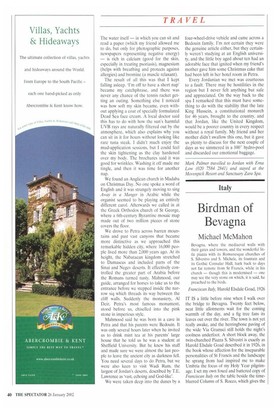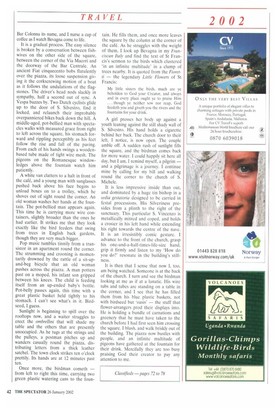Italy
Birdman of Bevagna
Michael McMahon
Bevagna, where the mediaeval walls with their gates and towers, and the wonderful little piazza with its Romanesque churches of S. Silvestro and S. Michele, its fountain and its Gothic Consular Hall, hark back to days not far remote from St Francis, while in his church — though this is modernised — one may see the very stone on which, it is said, he preached to the birds.
Franciscan Italy, Harold Elsdale Goad, 1926 IT IS a little before nine when I walk over the bridge to Bevagna. Twenty feet below, neat little allotments wait for the coming warmth of the day, and a fig tree fans its leaves out over the river. The town is not yet really awake, and the herringbone paving of the wide Via Grarnsci still holds the night's coolness underfoot. A short block away, the twin-churched Piazza S. Silvestri is exactly as Harold Elsdale Goad described it in 1926, in the book whose affection for the inseparable personalities of St Francis and the landscape he sprang from had inspired me to make Umbria the focus of my Holy Year pilgrimage. I set my own foxed and battered copy of Franciscan Italy on the table beside the timeblurred Column of S. Rocco, which gives the Bar Colonna its name, and I nurse a cup of coffee as I watch Bevagna come to life.
It is a gradual process. The easy silence is broken by a conversation between fishwives on the other side of the square, between the corner of the Via Macon i and the doorway of the Bar Centrale. An ancient Fiat cinquecento bobs flatulently over the piazza, its loose suspension giving it the corkscrewing motion of a boat as it follows the undulations of the flagstones. The driver's head nods slackly in sympathy, half a second out of sync. A Vespa buzzes by. Two Dutch cyclists glide up to the door of S. Silvestro, find it locked, and relaunch their improbably overpanniered bikes back down the hill. A middle-aged, pot-bellied man with spectacles walks with measured grace from right to left across the square, his stomach forward and rippling perceptibly as his feet follow the rise and fall of the paving. From each of his hands swings a woodenbased tube made of tight wire mesh. The pigeons on the Romanesque windowledges above the fountain watch him patiently.
A white van clatters to a halt in front of the café, and a young man with sunglasses pushed back above his face begins to unload boxes on to a trolley, which he shoves out of sight round the corner. An old woman washes her hands at the fountain. The pot-bellied man appears again. This time he is carrying more wire containers, slightly broader than the ones he had earlier. It strikes me that they look exactly like the bird feeders that swing from trees in English back gardens, though they are very much bigger.
Pop music tumbles tinnily from a transistor in an apartment round the corner. The strumming and crooning is momentarily drowned by the rattle of a sit-upand-beg bicycle that an old woman pushes across the piazza. A man potters past on a moped, his infant son gripped between his knees. The child is feeding itself from an up-ended baby's bottle. Pot-belly passes again, this time with a great plastic basket held tightly to his stomach. I can't see what's in it. Birdseed, I guess.
Sunlight is beginning to spill over the rooftops now, and a waiter struggles to erect the ombrellini that will shade my table and the others that are presently unoccupied. As he tugs at the strings and the pulleys, a postman pitches up and wanders casually round the piazza, distributing letters from a thick leather satchel. The town clock strikes ten o'clock prettily. Its hands are at 12 minutes past ten.
Once more, the birdman cometh — from left to right this time, carrying two green plastic watering cans to the foun
tam. He fills them, and once more leaves the square by the column at the corner of the café. As he struggles with the weight of them, I look up Bevagna in my Franciscan Italy and find the text of St Francis's sermon to the birds which clustered 'in an infinite multitude' in a clump of trees nearby. It is quoted from the Fioretti — the legendary Little Flowers of St Francis:
My little sisters the birds, much are ye beholden to God your Creator, and always and in every place ought ye to praise Him ... though ye neither sow nor reap, God feedeth you and giveth you the rivers and the fountains for your drink.
A girl presses her body up against a youth leaning against the still shady wall of S. Silvestro. His hand holds a cigarette behind her back. The church door to their left, I notice, is now open. The couple amble off. A sudden rush of sunlight fills the square, and the birdman comes back for more water. I could happily sit here all day, but I am, I remind myself, a pilgrim — and a pilgrimage is a journey. I continue mine by calling for my bill and walking round the corner to the church of S. Michele.
It is less impressive inside than out, and dominated by a huge tin bishop in a sedia gestatoria designed to be carried in festal processions. His Silveriness presides from a plinth to the right of the sanctuary. This particular S. Vincenzo is metallically mitred and coped, and holds a crosier in his left hand while extending his right towards the centre of the nave. It is an irresistibly comic gesture. I advance to the front of the church, grasp his one-and-a-half-times-life-size hand, grip it firmly and listen to my 'How do you do?' resonate in the building's stillness.
It is then that I sense that now I, too, am being watched. Someone is at the back of the church. I turn and see the birdman looking at me as if at a lunatic. His wire tubs and tubes are standing on a table in the corner, and I see that he has filled them from his blue plastic baskets, not with birdseed but 'oasis' — the stuff that flower-arrangers prod their displays into. He is holding a bundle of carnations and greenery that he must have taken to the church before I had first seen him crossing the square. I blush, and walk briskly out of the building. The piazza now bustles with people, and an infinite multitude of pigeons have gathered at the fountain for their drink. Mercifully they are too busy praising God their creator to pay any attention to me.



















































































 Previous page
Previous page